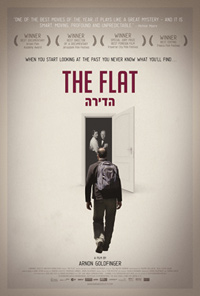Geneological Cryptography: Unearthing Incomprehensible Family Ties
 As the only member of his extended family truly interested in decoding his mysteriously secretive grandmother’s past, Israeli documentarian Arnon Goldfinger began to piece together her story through substantial research and multiple visits to surviving friends and associates, profiling a woman he seems to barely have known. The Flat reminds of the importance of genealogy, something that too often gets lost to the sands of time, and in doing so it also highlights the generational gap that allows the suppression of horrors passed to extricate from pain to become but a marker in history, something for future generations to remember and hopefully learn from.
As the only member of his extended family truly interested in decoding his mysteriously secretive grandmother’s past, Israeli documentarian Arnon Goldfinger began to piece together her story through substantial research and multiple visits to surviving friends and associates, profiling a woman he seems to barely have known. The Flat reminds of the importance of genealogy, something that too often gets lost to the sands of time, and in doing so it also highlights the generational gap that allows the suppression of horrors passed to extricate from pain to become but a marker in history, something for future generations to remember and hopefully learn from.
In tracing back family roots, one is likely to discover a variety of fascinating historical tidbits like forgotten ties to royal forefathers or ancestral links to major historical turning points thought lost to history or too far from home to be involved through blood. Sometimes these discoveries can be life changing events that morph self image or alter the perspective on one’s family as a whole. Shortly after the passing of Goldfinger’s 98 year old grandmother, Goldfinger’s family began to sort through the massive amount of belongings she left behind in her quaint city apartment, cleaning out the space for future use, finding buried memories along the way. One of these moments came with the unearthing of personal correspondence with a known Nazi propagator date both before and after the war – odd for a Jewish German exile who fled to Tel Aviv before the impending doom of genocide took her and her young family.
Arnon seems a man from another time, completely consumed with the idea of tracing back his roots back into Germany and beyond. His mother, on the other hand, doesn’t even seem remotely interested to know the truth of her own mother’s personal life. As he pages through his grandmother’s many stashed paper stacks – old utility bills, old newspaper articles, old hand written letters, personal photographs – Arnon keeps finding the name of a German officer who wrote for the most prominent Nazi paper at the time and was noted to be close to Goebbels, one of Hitler’s right hand men. The question of why this man and his wife could be in such close contact with his grandparents ached within him, so Arnon started making phone calls to friends and relatives who may have known them, and down the line moved on to local historians as more facts started to surface.
The film itself seems to have evolved from something like a personal documentation, with little interest in conscientiously composing images within the frame or any form of defined subject, to something much more as the mystery unraveled. Not long into his research, Arnon is faced with the extreme touchiness of German citizens at the thought of bringing talk of the Nazis and World War II to the table, all the while finding that delving into the past can also be quite a painful experience. It turns out that his grandmother failed to ever tell her family that soon after her own mother refused to leave her home in the late 30s, she was taken to the nearest concentration camp where she was murdered for being a Jew. The Flat‘s natural juxtaposition of Arnon’s personal tragedy and his interviewee’s inherited shame is startling, poignant and plainly moving, but it isn’t until the film’s surprising final frames that it becomes clear that time can not heal all wounds as the phrase goes. Eventually it merely swallows them whole, for better or worse, never to be seen again.


